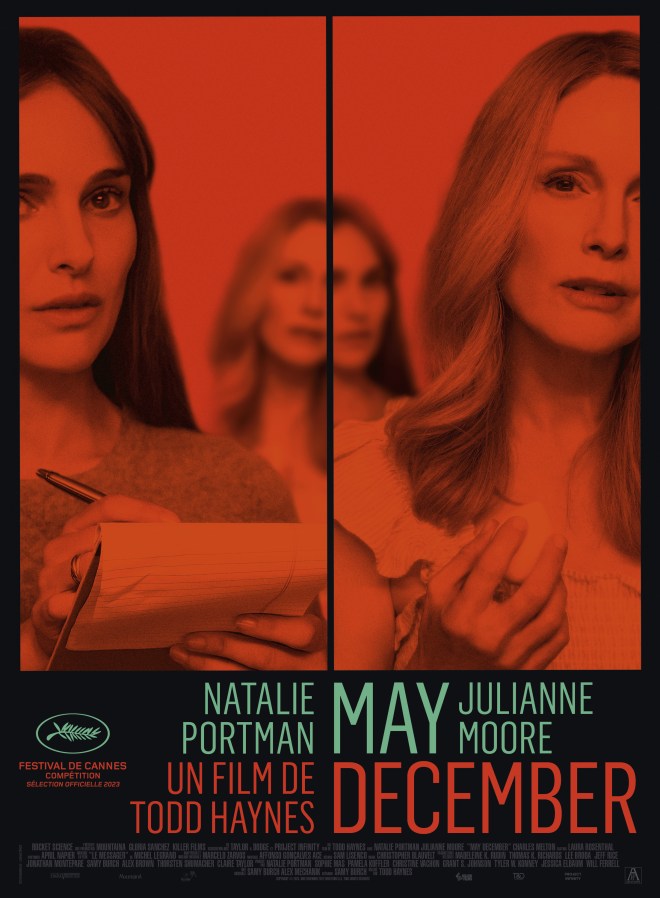LONDON FILM FESTIVAL REVIEW: TODD HAYNES’ TABLOID MELODRAMA EVOKES SUNSET BOULEVARD WITH CAMPY INDULGENCE
Scouring through the underbelly of the glam rock world in Velvet Goldmine and navigating the unseemly suburbs of 1950s New York in Carol – Todd Haynes is no stranger to solitary landscapes. And it would seem that scandal remains the through-line of Haynes’ filmography, as the director once again finds himself on similar footing.
A tabloid drama ripped from the (literal) headlines – May December takes inspiration from the real-life story of Mary Kay Letourneau – an American teacher who had a relationship with her 12-year-old student. Natalie Portman and frequent Haynes collaborator Julianne Moore set the stage for this caty showdown that swings between irreverent and self-serious like a soap-operatic pendulum. Twenty years following their public scandal, Gracie (Moore) and her now husband Joe (Charles Melton) lead a secluded life, until one day they are visited by Elizabeth (Portman) – an actress who is set to play Gracie in an upcoming biopic. As Elizabeth peers further and further into the cracks, the home truths of Gracie and Joe’s relationship come to a tense culmination.
“Why would you want to play someone who you think is a bad person?”, Elizabeth is asked at one point, to which she replies, “It’s the moral grey areas that are interesting”. Indeed it’s the moral grey areas that make May December just as interesting, a film that offers a narrow view of the past and an obscured view of the present. Recalling the psychosexual thematics of Patricia Highsmith but inherently cut from the same cloth as Ingmar Bergman’s Persona – Haynes’ latest is a stylistic melting pot that takes comedic strokes as broad as its dramatic ones. In an early scene, Moore exclaims, “We’ve run out of hotdogs!”, as Marcelo Zarvos’ flamboyantly percussive score accentuates what is an objectively throwaway remark in true telenovela fashion. Haynes, with the aid of Zavros, often takes this idea of melodrama to dishy new heights, punctuating consumer’s need to relish in tabloid gossip.
As previously demonstrated by Portman herself in Black Swan – art and obsession are never a sustainable combination. Yet it’s evident that the ballerina’s dangerous fixation proves a strong basis for Portman to explore Elizabeth’s comparatively obsessive tendencies. The lengths one will go to master their craft has always been an intriguing concept but it’s the added element of journalistic intrigue that edges Elizabeth closer into perverse territory. What starts as curious, slowly turns creepy in a disarming performance that will undoubtedly become of one Portman’s finest. But it’s when the actress shares the screen with Moore that the film really spits its venom. Elizabeth and Gracie both have the claws of Norma Desmond, but it’s a tug of war as to who’s wearing them. Gracie’s slyness is unassuming but she is more than aware of her own power and influence. Moore’s deceivingly gentle performance allows Gracie to be truly unpredictable and impulsive in the way of Kathy Bates’ Annie Wilkes.
Overall, Moore is underutilised as the story pulls focus towards her husband Joe. Although a somewhat audacious casting move, Riverdale actor Charles Melton effortlessly bares the film’s entire emotional weight on his shoulders. What starts as a gossip-ridden drama, unfurls into a tragic tale of abuse and stunted growth. Elizabeth serves as the catalyst for a man who seems to have been lost in time and forced to grow up far too quickly; Melton terrifically sells this sense of forced maturity as Joe’s inner tournament erupts.
Haynes continues to add new flourish to a space that is (at this point) considered his comfort zone. The director has undertaken a much stranger beast of a script that’s as multi-layered as a mille-feuille and unpredictable as the two actors at the centre of it. But it’s really Haynes’ confidence in taking these broad tonal swings that enable May December with a certain sense of audience awareness. There’s a villain lurking in the shadows of this scandalous drama but Haynes has a lot more to say about our inherent need to indulge in it in the first place.
Written by James Punshon

